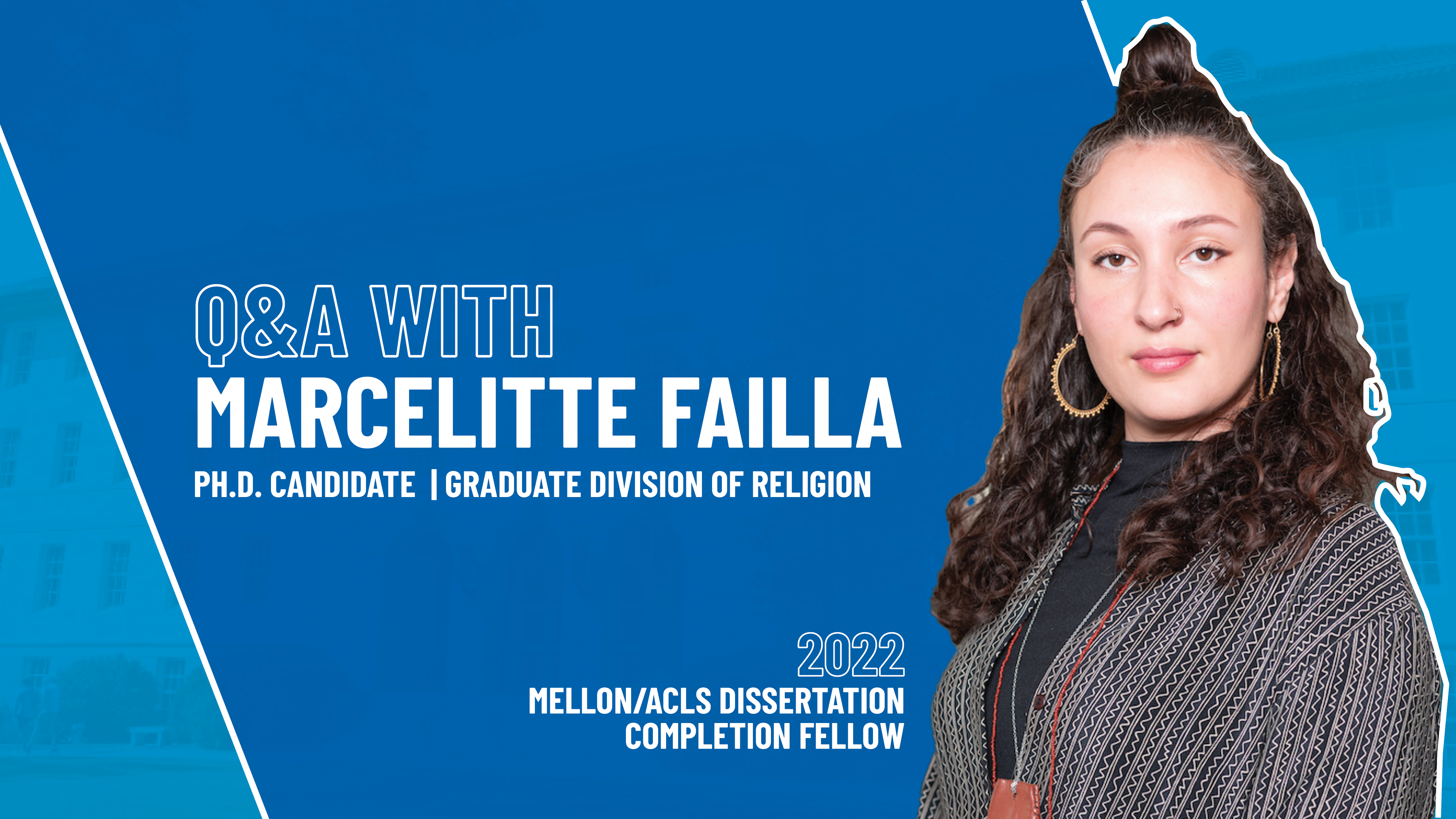
Q and A with Marcelitte Failla
Marcelitte Failla, a doctoral candidate in the Graduate Division of Religion, was named one of the 2022 recipients of the Mellon/ACLS Dissertation Completion Fellowship. This Fellowship champions advanced graduate students by providing resources to complete projects and studies necessary for finalizing their Ph.D. dissertation. This support enables doctoral students to lay a strong foundation for the continuation of their scholarly careers.
Marcelitte’s dissertation investigates Black witchcraft and how practitioners employ its spiritual technology for manifestation, healing, and protection from anti-Blackness. As an educator, researcher, and scholar, she uses a Black feminist lens to explore how religions such as Yoruba Ifá, Haitian Vodou, and Hoodoo of the American South are used for collective healing and social justice.
We asked Marcelitte to give us more insight on this Fellowship, what drew her to this field of study, and what she’d like us to know about her research.
In your opinion, what is the significance of exploring this topic?
This scholarship is significant for a few reasons. First, the study of African-heritage religions is still underrepresented in the field. Scholars like my mentors, Dr. Dianne Stewart and Dr. Yvonne Chireau, have made significant contributions but much more needs to be done. Especially at a time when many Black Americans are leaving the Black Church and turning to African-heritage religions or eclectic spiritual practices. Students want to know, and I believe we need more professors who can help answer their myriad of questions.
It is also significant because political movements—like Black Lives Matter and Black Feminism—are currently intersecting with African spirituality in important ways. Groups like the Chesapeake Conjure Society employ the African-derived religion of Hoodoo toward liberatory aims for Black people while also doing work to honor and elevate ancestors murdered by the police. Thus, the study of contemporary African-derived spirituality is not merely a study of religion but also a response to how social change is currently happening.
Lastly, the study of the Black witch further legitimizes what kind of scholarship can be done in the academy and insists it is taken seriously. I hope that my work encourages scholars just entering their Ph.D. programs to research areas that feel right even if it is not widely accepted or has not been given much previous attention.
What was your inspiration for this research topic?
I was drawn to African-heritage religions and the Black witch primarily because I grew up with it in my household. My mom is an eclectic spiritual practitioner and chiropractor who uses energetic healing in her practice. I grew up reading tarot cards, giving oranges and honey to the Yoruba deity Osun and harnessing magic for justice purposes when the racism of rural Oregon became too much. Today, I identify as a Black witch and am a practitioner of the religions of Yoruba Ifá and the African American religion of Hoodoo. It was a natural calling that informs many aspects of my life.

What are some of the biggest lessons you’ve learned while doing this research?
As an ethnographer, I learned to not start writing until I had actually spoken to people. I think I wrote a whole chapter and then, after my interviews, realized it was all wrong and needed to scrap it and start again. I also learned to enjoy the process and how important it is—at least for me—to stay in community. I had a lot of fun meeting Black witches, going to events, and sharing my own experiences as a practitioner. As the resulting articles (and eventually the book) come out, it is crucial that the research feels like a community collaboration and accurately reflects my respondent's stories. Ultimately, I want my research to be valuable both within and outside the academy.
What drew you to the Laney Graduate School?
I was initially drawn to the Laney Graduate School due to the presence of African-heritage religious scholar Dr. Dianne Stewart. I remember randomly emailing her, and after a long phone call, she encouraged me to apply and offered to meet with me before the application deadline. When I arrived for my interview, I was further impressed by the Graduate Division of Religion and the Laney Graduate School. Everyone was very kind and supported my interest in activist/ethnographic scholarship.
What else would you like us to know about your research?
Although not stated in the abstract, this current Black witch movement is very queer and trans-affirming. This is significant in the context of African American religious-political movements as many, such as the Nation of Islam, have exhibited homophobia and transphobia in their rhetoric. Many contemporary Black witches, for example, honor non-binary African deities like the Yoruba Orisa Osunmare and incorporate queer theory into their spiritual analysis and movement-building work. Overall, I am very excited about this moment in Black religion. I believe there is a current cultural shift that interweaves Africana religion with Black feminist and queer political analyses.